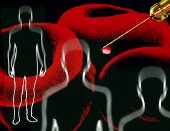- Could Artificial Sweeteners Be Aging the Brain Faster?
- Techniques for Soothing Your Nervous System
- Does the Water in Your House Smell Funny? Here’s Why
- Can a Daily Dose of Apple Cider Vinegar Actually Aid Weight Loss?
- 6 Health Beverages That Can Actually Spike Your Blood Sugar
- Treatment Options for Social Anxiety Disorder
- Understanding the Connection Between Anxiety and Depression
- How Daily Prunes Can Influence Cholesterol and Inflammation
- When to Take B12 for Better Absorption and Energy
- Epsom Salts: Health Benefits and Uses
Drug May Be Antidote to Bleeding Tied to Blood Thinner Pradaxa


The new blood thinner Pradaxa (dabigatran) is being widely used, but it comes with one serious drawback: rare but dangerous cases of sudden, uncontrolled bleeding in patients.
Now, a new study finds than an experimental, injected drug called idarucizumab could be used to quickly stop that bleeding.
“Idarucizumab completely reversed the anticoagulant [bleeding] effect of dabigatran within minutes,” researchers say in a study published online June 22 in the New England Journal of Medicine.
In recent years, new-generation blood thinners such as Pradaxa have been approved as more manageable alternatives to older drugs such as warfarin.
Unlike warfarin, these drugs “do not require blood tests for monitoring… while offering similar results in terms of effectiveness,” explained Dr. Kevin Marzo, chief of cardiology at Winthrop-University Hospital in Mineola, N.Y.
However, “the Achilles heel of this new class of blood thinners has been lack of an antidote for quick reversal — particularly in the setting of life-threatening bleeding,” he added.
So, the hunt has been on for an antidote drug that doctors could use whenever this rare threat arose.
In the new international study, a team led by Dr. Charles Pollack Jr. of Thomas Jefferson University in Philadelphia tracked outcomes for 90 patients.
These patients — typically people needing emergency surgery or having suffered acute trauma — were treated with idarucizumab after they experienced uncontrolled bleeding subsequent to taking Pradaxa.
According to the study, idarucizumab reversed the condition in 100 percent of the cases, and the effect “was evident within minutes.” Lab tests conducted over the next 12 hours showed that blood clotting levels returned to normal in nearly 90 percent of patients.
The study, which was funded by drug maker Boehringer Ingelheim, was also slated for presentation on Monday at the International Society of Thrombosis and Haemostasis 2015 Congress in Toronto.
According to Marzo, the findings suggest that “an antidote appears to be on the horizon and likely will be lifesaving for those rare, life-threatening bleeding episodes” connected to drugs like Pradaxa. He believes that the availability of an antidote should also make doctors less reluctant to prescribe Pradaxa in the first place.
Another expert agreed.
“Many practitioners have opted to use Pradaxa as a safe alternative to warfarin,” said Dr. Nicholas Skipitaris, director of cardiac electrophysiology at Lenox Hill Hospital in New York City. “The presence of an antidote for Pradaxa should only further this trend.”
More information
There’s more on blood thinners at the American Heart Association.
Source: HealthDay
Copyright © 2026 HealthDay. All rights reserved.










